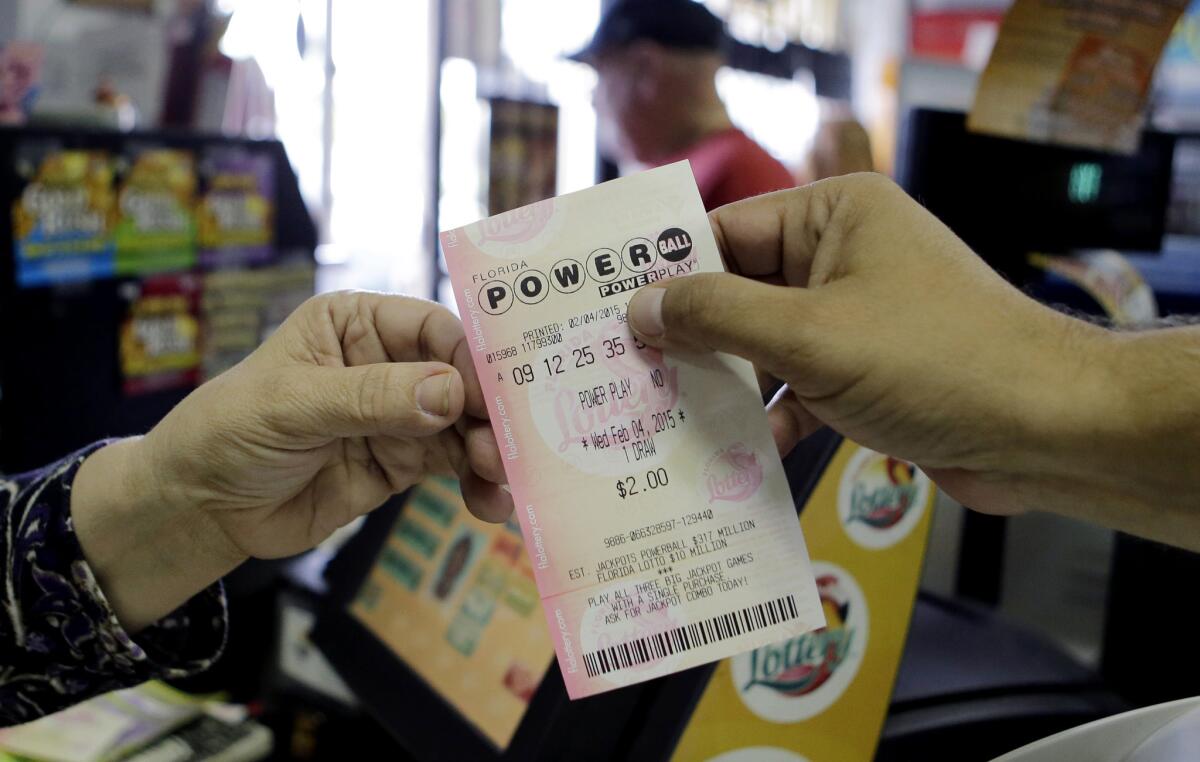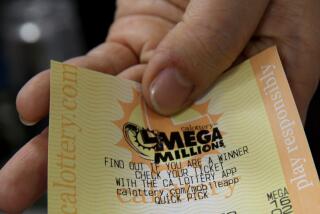Powerball jackpot reaches $500 million, only the latest mega prize

- Share via
The Powerball jackpot hit $500 million on Wednesday. It’s the third-largest jackpot in the game’s history and the fifth-largest lottery jackpot in U.S. history. So is that actually a big deal?
Mega jackpots are a regular occurrence now, with totals of more than $300 million coming along every few months.
Quiz: Test your knowledge of Powerball
Here are some answers to questions you might have about Powerball jackpots:
Haven’t we had a lot of big jackpots lately?
Yes.
Powerball fever pulsated through the U.S. in the fall of 2013 courtesy of a $588-million jackpot, and by April 2013, the game arrived in California. Since then, jackpots of more than $300 million have occurred every few months.
Many states have been in the Powerball game, juicing up those jackpots, but the lotto’s Mega Millions game also has seen more frequent large prizes thanks in part to tweaks that made the odds of winning a jackpot longer.
The turnaround is due in part to changes made to the lottery in 2010, when revenues were on the decline. The California Legislature passed a law that essentially brought bigger, more frequent large prizes, but they also altered the formula for how much revenue public schools received.
Poll: Are you playing Powerball?
When California joined the Powerball game in 2013, the number of tickets being bought soared, which state lottery officials said also said contributed to the more frequent big jackpots.
In early 2014, the L.A. Times reported that players had seen their potential winnings jump 59%, while retailers that provide lottery games had seen 38% more money. Education funding was also up 21%.
How do I get in on the prizes?
Powerball tickets are sold for $2 apiece in 43 states, the District of Columbia, Puerto Rico and the U.S. Virgin Islands.
Jackpots start at $40 million and rise when there is no grand-prize winner. No one claimed the estimated $394-million jackpot in Saturday’s drawing, but it did yield two tickets worth about $1.4 million each.
To claim the jackpot, a ticket must match five “regular” numbers as well as a sixth “powerball” number. Draws occur Wednesdays and Saturdays at 7:59 p.m. Pacific time. Tickets sales end about an hour before each draw.
What do I do if I win?
Only six states allow winners to be anonymous. Others offer exceptions for circumstances, such as domestic issues and protecting peace officers.
In California, you don’t have a choice. Lottery officials have said that some winners, even when they understand that their names are a matter of public record, make requests not to publicize their names. Those requests are denied and the names are put out in a new release.
Winners do, however, get a handbook that seeks to describe how their lives are about to change.
MORE: California Powerball jackpot winner invokes ‘luck of the Jedi’
“Most of the time, it is advisable to get it over with the press so that you don’t have one or more reporters following you around to get that ‘exclusive’ interview,” the state’s site advises winners.
What are my odds of winning -- or of having 11 toes?
No one has claimed a Powerball jackpot since a winning ticket was sold in Washington state for the Nov. 29 drawing. California Lottery officials say the Powerball jackpot hasn’t been this big since Feb. 19, 2014, when B. Raymond Buxton bought a $425.3-million ticket in a Milpitas gas station.
The odds of winning the Powerball jackpot are the same at each drawing -- about 1 in 176 million. You’re more likely to be killed by an asteroid in your lifetime. Below are odds of other things happening to you, to keep things in perspective:
Any person’s lifetime odds of being killed by an asteroid impact: 1 in 700,000. Odds of an American being killed in a terrorist attack (in about the last five years): 1 in 20 million. Odds of dying in a shark attack: 1 in 3.1 million. Odds of dating a supermodel: 1 in 880,000. Chance of being struck by lightning: 1 in 12,000 -- but some climate scientists predict that will narrow to 1 in 8,000 by 2100. Odds of dying from flesh-devouring bacteria: 1 in a million. The odds of having an 11th toe: 1 in 500.
Twitter: MattStevensLAT
More to Read
Sign up for Essential California
The most important California stories and recommendations in your inbox every morning.
You may occasionally receive promotional content from the Los Angeles Times.









